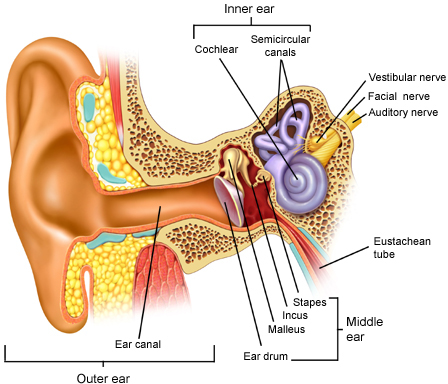Dizziness or vertigo can be a very confusing and debilitating symptom to deal with. It is also a very common complaint with about 15% of the population experiencing it. Of this population, 40% originates from the inner ear, known as the vestibular system.
The vestibular system’s job is to sense head movement and position in relation to gravity and relay this information to the brain. When there is incorrect or conflicting information from one or both sides of the ear, vertigo or dizziness occurs.
The most common cause of these symptoms such as a feeling of the room spinning or a sense of rocking, tilting or sudden drop is a condition known as Benign Paroxysmal Positional Vertigo or BPPV for short. Other symptoms that can accompany this condition and other inner ear conditions include nausea, vomiting, visual and hearing disturbance and sweating. BPPV most commonly affects people aged between 40-60 years old with more females affected than males. The name describes the condition with “Benign” referring to no serious or sinister sequelae of the condition, “Paroxysmal” referring to the sudden onset of symptoms, and “Positional Vertigo” referring to the sensation of spinning or dizziness coming on with certain positions or neck movements.
BPPV is caused by a presence of debris within the semicircular canals which lie within the inner ear. This debris is most often small crystals that have dislodged from their normal position in the ear. This in turn causes abnormal stimulation of the sensory hair cells in the semicircular canal and leads to feeling like the ground is coming up to meet you or the walls are spinning.
A visual representation of the ear, the source of all vestibular problems. Note in particular the close relationship of the inner ear and semi-circular canals.

A visual representation of the ear, the source of all vestibular problems. Note in particular the close relationship of the inner ear and semi-circular canals
Luckily, BPPV is not a serious condition and can be easily fixed with the help of a qualified Physiotherapist. Through the use of specific assessment and treatment techniques, Physiotherapists trained in vestibular conditions can positively assist in the resolution of BPPV as well as chronic dizziness.
Lifecare Cottesloe Physiotherapy is lucky enough to have our very own Jacinta Dwyer trained in BPPV and vertigo assessment and treatment, and helping our other physio’s to improve their skills in this area.
Book an appointment online or call (08) 9384 3269 to discuss your case.
